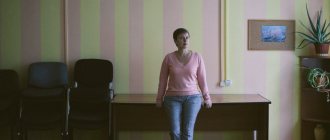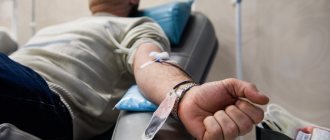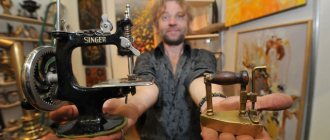More than 60% of Russians have a fear of cancer, while slightly less than a quarter are confident that the disease is contagious, and more than a third do not believe in the possibility of a complete cure for the disease, follows from a study on cancer phobia. Its results were presented on Wednesday, November 20, the day of the launch of the Khabensky Foundation’s information campaign aimed at combating this phenomenon.
Scientific cover
Monologues of a scientist about ethics and experiments on people
And although, as sociologists note, in Russia there is no mass tendency to mythologize the disease, and most residents of the country have sufficient information about it, often it is strong anxiety, as well as confidence in the incurability of the disease, that can prevent a person from undergoing a timely examination to detect cancer at an early stage. stages or influence the choice of treatment methods.
Izvestia got acquainted with the results of the study, and also talked with an oncologist, an oncopsychologist and a person who coped with cancer about where cancerophobia comes from, why it is dangerous, and when it can be useful - and whether it can be dealt with.
Incurable punishment for wrongdoing
One way or another, according to the study, fear of cancer is observed in 6 out of 10 Russians, while sociologists called the belief that Russians do not know about the problems of cancer and the causes of their occurrence an exaggeration.
Cancer tender: hospitals doubled spending on drugs for cancer patients
At the same time, costs for all other categories of drugs are reduced.
The highest phobia index (36%) was demonstrated by less wealthy respondents—those who, when asked about the socio-demographic factor, reported that they “don’t even have enough money for food.” At the same time, the mythological or stereotypical perception of the disease, according to this study, is characteristic of less than a fifth of the country's population.
However, the researchers note, there is a correlation between the fear of cancer and the belief that it cannot be cured in Russian realities. The researchers named the unpredictability of the disease as another factor causing fear.
The study, which was conducted by employees of the Levada Center (the organization is included in the register of NGOs-foreign agents) in January 2021, involved about 1.6 thousand respondents over 18 years old from 50 constituent entities of the Russian Federation. During the survey, almost half of them (43%) reported that cancer causes them the greatest fear compared to other diseases (heart attack caused similar emotions in 12% of respondents, stroke - in 10%).
At the same time, older women most often spoke about anxiety associated with diseases, as follows from the researchers’ findings. A total of 63% of respondents agreed with the statement that thinking about cancer makes them fearful: the majority of those who answered this way were women (71% vs. 54% among men) and older people (70% vs. 59% among young people).
Technology broadcast: prostate tumor removed online
According to statistics, this cancer is diagnosed in 30% of men in Russia
63% of respondents also expressed confidence that anyone can get cancer, 16% suggested that this is due to genetic predisposition, 12% - that the elderly are primarily at risk. Among the factors that may be associated with the occurrence of cancer, respondents most often named poor ecology, heredity, increased levels of radiation and stress (57%, 49%, 46% and 42%), respectively. About a third of respondents also noted products containing GMOs and genetic mutations. Smoking was in last place on this list (29%). In response to another question from the researchers, 15% of survey participants said cancer was a punishment for sins or wrongdoings.
At the same time, 23% suggested that when in contact with a person with cancer, there may be a probability of infection - low, medium or high - which is not true. 67% responded that cancer is not contagious. Another 11% found it difficult to answer the question about the degree of contagiousness of the disease. 17% of respondents were in favor of avoiding contact with cancer patients, another 73% reported that they did not agree with this statement.
Slightly more than a third of study participants do not believe in the possibility of being cured of the disease. Thus, 36% of respondents expressed confidence that cancer always leads to death, another 34% said that even if cured, a person will forever remain disabled. In addition, 19% said that they would prefer to find out about the disease at a late stage, “so as not to poison your life with thoughts about this disease” (72% of respondents disagreed)
However, the vast majority - 79% of respondents - said they were confident that the disease should be treated with potent therapy. About a third (29%) of respondents believe that treatment can only be done abroad; 61% disagreed with this statement. About half - 48% - said that in Russia, in their opinion, certain types of cancer can be treated well.
“We will have a sharp jump in mortality”
Director of the Institute of Hematology of the Rogachev Center Alexey Maschan - about the shortage of oncological drugs, its consequences and tumors that medicine has learned to cope with
Cancer and horror. When cancer phobia is worse than cancer.
Needless to say, it is precisely this manifestation of oncophobia that can cost a person his life? What if the oncologist has a really serious problem, such patients end up with an advanced stage and an unfavorable prognosis?
And if in my case cancerophobia affects the quality of life (it deprives me of sleep, causes depression and apathy), then with the panicky fear of examinations and doctors it puts life itself at risk, which is already an alarm signal.
And there is one important external factor that aggravates the problem. It is associated with the third reason for the occurrence of oncology, namely the reaction to the information noise that accompanies the topic of oncology.
Remember links in your friends’ feeds to pseudoscientific articles about the causes of cancer and 100% methods of treating it? This is exactly it. Sensational exposure of the conspiracy of the pharmaceutical industry, lists of products that cause cancer, traditional medicine recipes that can protect against it, and all this with loud headlines and aggressive calls “not to kill yourself with chemistry.”
Even mentally stable people occasionally fall into doubt and mistrust, especially given the complexities in our healthcare system. People with signs of neuroses stop analyzing information altogether, taking everything they read as an undeniable truth. It is they who later, when experiencing alarming symptoms, begin to make cabbage compresses, drink soda, and protect themselves from radiation from household electrical appliances in ways worthy of mention in science fiction films. And it is they who do not always have time to receive real medical help, because the lack of timely treatment and stimulation of the body with dubious procedures only provoke the progression of the disease.
Of course, cancer phobia, like any other mental disorder, can be treated. This means working with a psychotherapist and possibly taking antidepressants. That is, it requires some effort, which is especially difficult when your state of mind is already shaken. And if in the case of oncophobia arising due to illness from close or personal experience, we are talking about a dramatic coincidence of circumstances, then this artificially inflated excitement forces us to pay special attention. Because people who spread false information think that in this way they are saving a whole flock of lost sheep. But that's not true.
And I want to address them directly:
If you seriously think that chemistry kills, and wormwood infused with hemlock saves you from cancer, that’s your own business. Wrap yourself in a cabbage leaf, sprinkle soda on your head and rejoice. But please do not convey secret knowledge by reposting on social networks.
This information can distract a person from important steps, making the problem worse. Understand that this is a crime, albeit unintentional, but still the responsibility for which lies with you.
Cancer is a serious disease. You need strong nerves, fortitude, awareness and optimism to win. Please note that this list does not include items like “faith in unicorn milk,” which means that a person in trouble needs reliable, clinically proven information. Share this or don't share at all. And then, perhaps, you will really save someone from trouble.
And if you already feel signs of cancer phobia, I can recommend a personal way to cope with its manifestations. I call it “2x2”, and it means the following. I only see a doctor if I have pain for more than two weeks. Until this moment (if the pain is not acute) I observe. And to be on the safe side, I ask the opinions of two doctors to minimize the risk of medical error. Then I decide on treatment tactics and get treatment. And so on for five years. Because cancer is a serious disease, but it is treatable. Provided that you are being treated and not sitting in a soda solution.
“The tumor actually takes a long time to grow”
Doctor of Medical Sciences, Professor Anatoly Makhson , now the chief oncologist of the largest network of private clinics MEDSI, and previously the head physician of one of the leading oncology hospitals, just recently and for the first time in his life, underwent a comprehensive examination - screening for the most common forms of cancer. In a conversation with Kommersant, he explained how to deal with fears and why, not suffering from any cancer phobias, he had not been examined before.
— Why are people more afraid of oncology than of stroke or heart attack? After all, according to statistics, the mortality rate for these diagnoses is significantly higher.
— Firstly, cancer is still a serious disease. And secondly, there is an opinion among our people that if you get cancer, then that’s it, the end. But this is a wrong opinion.
There are hereditary cancers, but there are very few of them; for the entire mass of oncological diseases, we can literally talk about 1%. Against the background of all cancer diagnoses, we can only talk about heredity in relation to breast cancer and ovarian cancer. In these cases, where there is a genetic mutation, the probability of the disease can actually be up to 85%. But even here, if a woman noticed this in time and sought help, the success of treatment is quite high.
— The key word here is “on time.” But often cancer phobia is so great that fear prevents you from going and checking.
— We still don’t talk much about oncology, and therefore know little, much less about the successes in this area of medicine. Abroad, it is customary to talk about this in public space, without hesitation, without fear of sidelong glances. There are entire series of programs where people, right up to the president of the country, talk about their successful fight against this truly serious disease. But in our country, rarely do anyone remember such positive examples.
But if a person, especially a famous one, died of a malignant tumor, then thanks to the same media, everyone immediately knows about it. That’s why there is such a fear among people that as soon as you go to the doctor, as soon as they touch your tumor, death is immediately guaranteed. That’s why they drag it out until the last minute, when there are fewer and fewer opportunities to fix something. But the sooner a person comes to an oncologist, the smaller his tumor is and, therefore, the greater the chance of eliminating it.
On average, of all malignant tumors with modern medicine in Russia, more than half of their forms can be cured. We can confidently talk about 54% of successful cures for all cancer diagnoses.
— How to understand this average figure?
- Well, for example, with regard to skin cancer, this is almost 98% of success with timely treatment, with breast cancer - more than 85%. There are, however, tumors where the prognosis is poor from the very beginning, but they are rare. Breast cancer, for example, is a common disease, but it is well treated, especially in the early stages. The same can be said about the prostate in men.
— Fear of pain, the existing pain management system forces people to commit suicide...
— The main problem of tumors is that in the early stages they do not give any clinical signs, they do not hurt or bother. When pain appears, this indicates that the disease is already in an advanced state. Consider that in 98 cases out of 100 these are already symptoms of the fourth stage of cancer, when it is almost impossible to cure a person.
But to avoid this, there is only one mechanism. After the age of 40, when the risk of getting sick increases, you need to undergo regular examination to identify the most common tumors.
For women, this includes breast screening, gynecology, skin, stomach, and lungs. In men - the prostate gland, lungs (this is mainly in smokers), stomach, colon, kidney tumors.
There are different types of cancer, and screening for each type will be very expensive and quite difficult. But for the most common ones, yes, it is necessary.
A person should go to the doctor not because something hurts, but for prevention. And then, when a malignant tumor is detected at the initial level, the probability of curing it is close to 90–98%.
Not to mention the fact that modern medicine today allows not only to cure breast cancer, for example, but also gives a woman the opportunity to give birth to a healthy child.
Previously, it was believed that cancer was an absolute indication for removal of the mammary gland and often the ovaries. Now you can save them. In the 62nd hospital where I worked, we cured cancer for more than a dozen women, and subsequently they gave birth to completely healthy children. I know mothers whom I treated and whose children are already five to seven years old. Therefore, if cancer is diagnosed in time, there is always a very good chance of defeating the disease.
— We talk about the need to be examined regularly, but do all Russians have such a free opportunity under compulsory medical insurance?
— Screening is still different from a medical examination, this must be understood. It aims to look for certain early stages of a tumor. This is special equipment. For example, let’s take one of the most common tumors—lung cancer. It can only be detected by low-dose computed spiral tomography. Or a stomach tumor - you need to do a gastroscopy, this is not done during medical examinations. Screening is a very financially expensive procedure; in some regions there are compulsory medical care programs, including screening ones, but in others they do not work because there is no money. Or, in the end, there are no specialists who can work with such high-tech medical equipment.
In Japan, for example, one day of screening now costs about $1 thousand. And the level of detection of stomach cancer at an early stage is approximately 1–2%. But it’s set up this way there because this country used to be one of the first places in terms of mortality due to stomach cancer, but now it has dropped to 26th. No one detects this oncology at an early stage more and more thoroughly than they do. They operate on more than half of the patients without any incision at all. There is the possibility of submucosal dissection, when at an early stage this tumor can be removed along with the mucosa through an endoscope. Two days later the patient goes home, and that’s it, there’s no need to worry about anything else.
There, the employer pays for screening; it is beneficial for him due to tax benefits. And if a person has not undergone the mandatory screening procedure and develops a stomach tumor, then he pays for his own treatment, without any insurance.
- But that’s what they have, but what do we have with screening?
“We, of course, do not have such screening capabilities for all types of cancer. But even what is there, it is not fully loaded. For example, more than a hundred mammographs have been purchased in Moscow, but healthy women do not come to be checked! They don’t go, and everyone is afraid!
— How much will such an examination for the most common types of cancer cost, if you set a goal to do it regularly?
— Prices vary in different clinics, on average - 35–45 thousand rubles. But for screening to be effective, it must be widespread. On average, our cancer incidence is far from the highest in the world: per 100 thousand people there are approximately 400 cases of cancer annually. But in order to identify them, these 100 thousand people must come for screening, but they don’t come, hence our screening efficiency is insufficient. Well, 10 people or even 100 people came - the probability of detecting a tumor in them is less than 0.5%.
I’ll tell you another terrible figure from the same series:
In Russia, about 600 thousand people get cancer every year, and about 300 thousand die. If we transfer these figures to our 140 million population, we get a very impressive cancer indicator.
Is it clear why people are afraid of cancer? They do not believe in the quality of our medicine, they do not believe that they will be able to receive qualified help or a correct diagnosis. But, whatever these fears, you need to take responsibility for your health! After all, if preventive examinations became the norm in our country, these numbers would decrease significantly. Early diagnosis means a fairly quick cure.
— There are often stories online of people who were regularly checked, but in the end, cancer was still detected in the third or fourth stage.
— The tumor actually takes a long time to grow. It’s hard to believe that three months ago you were checked, and then suddenly the tumor immediately became large.
“And there is also a persistent idea that cancer is contagious.
— I’ve been in oncology since 1972, and for more than 40 years, it turns out, I’ve been surrounded by cancer patients. Can I get sick? Can. But not because cancer is contagious. All this is nonsense, no one has proven this, that cancer is transmitted through contacts. Another thing is that anyone can get sick, and the older the person, the higher the probability. For example, a prostate tumor, the average age for this disease is 60 years. And in principle, anything that weakens the body’s defenses can theoretically increase the chance of disease.
— People’s ideas about cancer are far from scientific.
- It is very rare, but it happens that the tumor can disappear on its own. I myself had such a case when a patient who had huge metastases of uterine cancer to the lungs, after a very disappointing diagnosis was made, lived for another 20 years. In her case, the body coped with the disease itself. Theoretically, one can imagine that the immune system itself began to fight and destroyed this cancerous focus. But such cases, I repeat, are extremely rare and cannot be fully explained.
In general, our people like to think that if you have cancer, then in two or three weeks you will die. Such beliefs are lies and nonsense! Even without any treatment, the patient can live for a year, or even two or three. And medical charlatans take advantage of this.
A young woman once came to our hospital with a huge tumor in her stomach. She was treated for a year and a half, as she herself said, by a psychic. He then told her: “Look, I held you for so long, now go and have the operation, and you will be healthy!” But it was no longer possible to help her, and precisely because she came too late. And if she had come a year and a half ago, we would have saved her.
— How can you still get rid of the fear of cancer? Is it true that fear of cancer can stimulate its appearance?
- To get rid of fear, you need to go to a psychotherapist; there is no other way to get rid of it. Talking about bad habits - smoking, stress, excess weight, etc. - has become common place, but this nevertheless still reduces the risk of getting cancer.
And if oncology does happen, you can’t completely immerse yourself in the disease, you can’t think only about it. You need to return to normal life as soon as possible, and then you will have a chance to get better. As for phobias, there is no direct connection, but it can significantly ruin your life.
People need to be informed that the percentage of those cured is also quite convincing. You need to come as early as possible, look for treatment regimens and believe that you will be cured. It may be a little worse in some places, better in others, but you can’t sit at home and just be afraid.
— Don’t you, an oncologist, get scared? And how often do you get checked?
— I must admit that I was examined only recently and for the first time in my life. I am, you know, a fatalist. And comprehensive screening took place because it was a mandatory condition in our clinic.
“It has long been scientifically proven that cancer is not transmitted by any means”
Kommersant asked the head of the department of breast tumors of the Federal State Budgetary Institution “National Medical Research Center of Oncology named after. N.N. Petrova" of the Ministry of Health of the Russian Federation, Professor, Doctor of Medical Sciences Petr Krivorotko .
— Among the fears associated with oncology, there is this one: you can get cancer if you care for a cancer patient for a long time. Does this phobia have a real basis?
- Well, you know, this is a completely wild show! It has long been scientifically proven that cancer is not transmitted by any means - neither airborne nor contact. People may be more concerned not about whether cancer can be contracted as an infectious disease, but rather about whether they or their loved ones can get the disease. And in this formulation the question has its grounds.
Indeed, a certain percentage of patients have a predisposition to the so-called hereditary forms of malignant tumors. And then we say that their probability of disease is much higher than that of the entire population. Forms of cancer such as breast cancer, for example, may have this tendency.
“Now all the women who read this will be even more scared.” How do you know if you belong to this high-risk group, and what to do with this information?
— In approximately 6-10% of our patients, we diagnose just this hereditary form of breast cancer. This means that in the family of such a cancer patient the probability of getting sick is eight to nine times higher than in others.
There is a carrier gene, the BRCA 1 gene, the mutation of which causes an increased susceptibility to breast cancer. But this does not mean that women in the family who are carriers will definitely get sick. In no case!
This is simply a reason to once again contact an oncologist in order to have an examination algorithm that will allow us to identify the tumor at the stage when we can definitely cure it.
We currently do not have in our arsenal any drugs, any medication regimens or pills that would protect a healthy woman who is a carrier of a gene mutation from the occurrence of this disease. Unfortunately, there are no such funds yet. But information about this heredity makes it possible to prescribe an earlier and more thorough examination for the patient’s relatives.
In order to find out whether there is such a predisposition, any healthy woman can take a blood test to determine if she is a carrier of a gene mutation. This analysis is now done in many laboratories. But this is an extremely rare situation. Basically, this analysis is performed when the diagnosis has already been made, that is, when it is already a routine procedure. In such a situation, this is more information for the blood relatives of the patient on the female side.
But we don’t grab the hands of the cancer patient’s relatives and demand that they go get checked. Each woman independently decides whether to notify her relatives about a predisposition to a gene mutation.
- It’s a lot of stress - living in fear, constantly thinking: what if I get cancer? Perhaps this is why many women do not want or, more precisely, are afraid to go get checked.
— As I already said, today there are no methods to prevent such hereditary predispositions to cancer diagnoses. But there is such a thing as “dispensary examination”. It has already been proven that mammography is the most informative method for early diagnosis of malignant breast tumors. But in each individual case everything is decided individually.
— Can a woman in Russia seek surgical help, as Angelina Jolie decided to do, not when the diagnosis has already been made, but earlier, for the purpose of prevention?
— In our country, carriage of a mutation without a diagnosis of malignancy is not an indication for prophylactic removal of the mammary gland - the so-called prophylactic mastectomy. Oncologists do not have any standards that would allow them to offer such an operation. And by the way, this is not allowed not only here. In most European countries there is also a ban on such surgical procedures. Mastectomy also does not guarantee that this problem will be solved forever.
— And if the disease was detected in time, is it possible to talk about any guarantees of its cure?
- Yes! If breast cancer is diagnosed at the first or second stage, then the probability of absolute cure reaches 90%. But the proportion of early visits with such a diagnosis is far from what we would like. Unfortunately, more than half of our patients seek help when some unpleasant symptoms or pain appear. And these, as a rule, are signs of a fairly advanced condition, when the third or even fourth stage of breast cancer is diagnosed. In such cases, it is extremely difficult to talk about a complete cure. We can rather talk about life extension.
I would like the population to be better informed, so that people are not afraid to go to doctors, not afraid to ask them about everything that worries them in connection with cancer.
“Women may also be afraid that as soon as their relatives, especially a loved one, find out about the diagnosis, problems will begin in the family. And perhaps that is why they delay coming to the doctor until the last minute.
— Such a phobia, specifically a female one, exists. Indeed, breast cancer requires quite a long treatment: surgery, chemotherapy, and radiation therapy. The general condition is impaired, hair falls out, and the quality of life drops significantly during the treatment period. And, to be honest, more divorces happen in such situations than in normal life, without oncology.
But it is basically impossible to hide the diagnosis if you are receiving modern treatment. It is very important to understand not only the patient, but also the family - husband, children, parents: yes, cancer is a challenge, but one that can be fought quite successfully. Especially if on time and together. Psychological support, especially from family, is very important; it greatly stimulates recovery. But the family itself also needs such help.
And perhaps my comparison will not seem entirely correct, but most motorists are already accustomed to insuring their cars. This is to some extent even enshrined in law. Your attitude towards your life and your health should be the same, if not more responsible. And then there will be no room for any phobias.
“Oncology attracts myths very strongly”
What complexes does oncophobia develop in a person, how to cope with the constant fear of getting sick and what to do if there is a cancer patient in the family - oncology psychologist Kamilla Shamansurova
knows firsthand.
In fact, cancer phobia is also a serious illness that can be understood more deeply by identifying the causes and consequences of fear of cancer. Let's focus on the consequences, these are the two poles of decisions made in the face of the danger of getting sick: in order not to miss the disease or “infection” with it, a person can either be constantly checked, without having any real reason, or completely refuse checks and visits to doctors, so as not to encounter shock of diagnosis and treatment.
When a person is overcome by fear of preventing or missing cancer, he begins to go to the doctor as often as he can. At the slightest suspicious symptoms, screenings are done, a lot of money and nerves are spent, such people can quite often experience panic attacks, stress, and depression. Phobic patients greatly torment themselves and their loved ones with their fears. But often, even realizing the hypertrophy of their reaction, they nevertheless cannot cope with it.
The other side of oncophobia, on the contrary, lies in excessive fear not so much of the disease as of the circumstances accompanying it - difficult treatment, physical changes, the threat of losing a job, material well-being, changes in appearance, social circle. The person does not go to get checked because he is very afraid. He doesn’t want to know what if he is diagnosed with cancer, and how to live then? The consequences of such a phobia are much more dangerous than the first, because there are great risks in the pathological reluctance to go to the doctor. You can really miss the point when the disease is not only easy to detect, but also easy to treat at an early stage.
There is a concept by Elisabeth Kübler-Ross, according to which a person, when faced with a traumatic event, goes through several stages of grief and acceptance; it also applies to the situation of cancer diagnosis. These are five stages, through which the patient’s nervous system, his psyche, prepares to accept and understand what happened.
First there is shock: you don’t understand what’s happening, you can’t comprehend it. There is a denial of the diagnosis: it doesn’t exist, it can’t be, the doctors made a mistake. Then there may be anger, aggression - the person is angry both at himself and at others. Then bargaining: if I do this and that, maybe it will all go away, disappear? The stage of depression is characterized by general fatigue and a lack of understanding of how to cope, to understand where to move next, but at the same time there is a realization that nothing can be changed, everything has happened. And as a finale - the stage of acceptance, when comes to terms with the situation and action towards its solution.
All these feelings can equally be attributed to the sick person himself and to his family and friends. At first, when the diagnosis becomes known, various horror stories suddenly creep out from the subconscious. There are many of them both in memory and on the helpful Internet, and the stories that come to mind are not ones with a happy ending, but rather very negative ones. About how someone burned out from cancer in a very short time, about how huge the queues are in our hospitals, and much more.
Immediately, a person who is already scared will hear a lot of maxims about how bad our medicine is, that he needs to prepare for the worst, that he needs a lot of money to start treatment. Outsiders give such advice, being absolutely confident in their outburst of goodwill, that they are helping and encouraging.
We are also faced with the detachment of medical personnel from the patient and his relatives, especially at the time of diagnosis, including sudden ones. For example, a disease is detected during a standard examination, medical examination or a routine visit to a specialist, and to clarify the diagnosis, the patient is sent for further examinations without further ado or explanation. As a result, the patient is scared because they are not talking to him, they are manipulating him, but if this happens in a hospital setting, a certain degree of readiness to hear that you are sick begins to appear. What if you are in the office, and suddenly, out of the blue: does your relative have cancer? Can you imagine the stress a person is experiencing who is not prepared for such emergency information?! It is at this moment that the greatest number of mistakes are made - from frequently changing medical institutions to turning to charlatans and pseudo-doctors.
In addition, oncology is a strong magnet for myths. It all starts with
people often don’t want to talk about their recovery, so as not to jinx it or attract envious people or ill-wishers. It’s easier for them either not to tell anything, or, conversely, to pretend that everything is still unclear.
When people talk about illness, they most often imagine a hospital, isolation, unpleasant and painful procedures. The fate of a person will be decided by complete strangers who are not at all inclined to indulge in explanations, because there are only 15 minutes of appointment, when, having written out the necessary directions and medications, the doctor calls the next patient for an appointment. And the patient is left alone with his fears in completely unfamiliar circumstances, a different culture, one might say.
All these phobias are a reaction to uncertainty. It is impossible to prepare for absolutely everything or for something you have never encountered. The sick person and his family do not know what to do, they try to think about many things and several steps ahead, and the medical system solves specific problems here and now - these are two different attitudes towards the disease, often conflicting from a psychological point of view. Plus there is also a heavy burden of long-term treatment: some kind of rays, chemo, surgery, hormones, side effects. “I will most likely die, everything is bad, there is no money, the treatment in Russia is terrible, it’s unfair” - all these negative stories are aggravated by our historical memory, when 20-30 years ago things really weren’t very good with cancer treatment.
Typically, cancer is viewed as something separate from life. The patient and relative are focused on treatment and recovery, and the rest of life is forgotten. In fact, life, even with oncology, goes on, but adjusted for changed circumstances and health. And, strange as it may sound, this is a certain test that needs to be overcome. Overcoming gives strength and better understanding of oneself.
There are also fears associated with the labor and material side of life. And this again applies not only to the cancer patient, but also to those who will care for him: “And if I am fired, how will I live, how will I buy medicine?”
Pity from others is very frightening. “It’s not a shame that you’re sick, it’s a shame how they look at you” - this is also a persistent phobia associated with oncology. For example, chemotherapy affects everyone differently: someone’s hair falls out, the structure of their nails changes, their appearance deteriorates, and those around them, wanting to cheer up the patient, give him awkward compliments that can hurt.
Another fear in such situations is that loved ones do not know what to talk about other than the illness. When I worked with cancer patients on the hotline, people most often said that they were afraid of offending their loved one with pity or, conversely, with apparent indifference to the disease, and did not know how to say that they were also very afraid and worried. Here a woman calls her sick friend and talks about her son’s broken knees, and she, who has just undergone chemotherapy, one of the most severe, thinks: “Why doesn’t she ask me how I survived this horror? And why should I care about children’s broken knees? This is such a small thing compared to what’s happening to me now!” Is it malicious intent or a bad friend? No, just a difference in life situations and misunderstanding, inability to speak.
Unfortunately, we have practically no programs for psychological support for families in such difficult life situations; we are not talking about the rehabilitation of relatives at all. In most cases, relatives of an oncological patient experience extreme stress throughout their illness, which they are forced to push down so as not to cause additional suffering to their loved one. It is generally accepted that a person caring for a sick person should not be weak, he should not show that he is ill. There is an opinion among psychologists that not only the patient suffers from cancer, but the family suffers. Therefore, we must not forget about relatives, because in a difficult situation they are the ones who will help the patient, provide support and, among other things, maintain contact with the medical system. Depressed relatives will not be able to help their loved one.
Even in the case of an oncological diagnosis, a perspective is needed: I will not be left alone, all the procedures will be written out for me, and it will be a program that takes into account individual characteristics, both medicinal and psychological. Medicine overly insists that the only way to be cured is through medication, and perceives all other methods as dangerous because they could potentially put the patient out of treatment. But there is also supportive therapy and psychological help. And they can not only complement the main treatment, but also in some situations strengthen it. The patient himself and his relatives should not be afraid to ask the doctor about everything that they do not know or do not understand. But often, relatives and patients do not know how to solve immediate problems: eating, mood swings, side effects after treatment, they turn to the Internet and find advisers, which complicates treatment and communication with the doctor. But it could be different.
Perhaps this is why they often go abroad not only for treatment, but also for human relations. To be able to have confidential communication when the doctor selects an individual treatment program and explains why you need to use this drug and not another. In order to avoid standing in queues, there are procedures after which you must immediately do the next one.
The medical system must see and hear the patient and be directed towards him, then there can be significantly more successful outcomes in oncology. This percentage will begin to change upward if everyone understands that it is impossible to be isolated in illness: the patient is connected with his family and environment, and they, in turn, are connected with him. Having a negative experience, a relative can become a problem patient for any doctor in the future, and this is how conflicts and phobias are born.
Life stories
It is precisely to combat the myths surrounding cancer, including myths associated with its incurability, that the new project of the Khabensky Foundation, which the charitable organization presented on Wednesday, November 20, is aimed at. One of the main goals of the #ThisCannotCure project is to show that cancer is not a death sentence, the foundation emphasizes, and to change attitudes towards the topic of cancer.
To do this, its authors collected stories of real people who managed to cope with the disease, but never overcame minor weaknesses or simply remained true to their habits. Celebrities also took part in the project - for example, TV presenter Vladimir Pozner (he also survived cancer) in one of the videos created as part of the project, spoke about the fear of sharks that had haunted him since childhood. You can see the stories of the project participants (the creators promise that their number will be replenished) on the website “raklechitsya.rf”.
Photo: RIA Novosti/Igor Russak
“It is impossible to concentrate support for cancer patients on one phone number”
Director of the Clear Morning service Olga Goldman - about the closure of the only psychotherapy department in the capital for people with oncology
— Several years ago, when our foundation grew and we began to look at the problem of helping children with brain tumors systemically, we realized the following thing: we can endlessly help specific children and families who are already faced with the disease, we can support the clinics where they undergo treatment, we can train doctors. And all this is very correct. But this is not enough. We realized that we need to work with literally everyone - with the widest audience, with ordinary people who have certain ideas about cancer,” actor Konstantin Khabensky, head of the foundation, told Izvestia. — Prejudices, myths, fears, which are often based on speculation, unverified or outdated information, or simply rumors. We want our little charges to live in a world where they are not told on the playground that they are “contagious” and are taken away from other children. We want people, upon learning that their friend, neighbor, or colleague has been diagnosed with cancer, not to bury him immediately, but to constructively offer help and know that this diagnosis is not a death sentence.
Denial and fear
Brake for immunity: why they gave the Nobel Prize in medicine
Scientists have found proteins that tumors secrete to locally suppress the body's defenses
In its pure form, cancerophobia is quite rare today, but it is often used to refer to any fears associated with cancer, explains Anna Kan, a clinical psychologist at the National Medical Research Center for Oncology. N.N. Blokhina”, who took part in the work on the project “#thiscannotcure”.
— There are not as many real cancerophobes, those who exhibit phobic symptoms, as it seems. “Cancerophobia” today is used rather as a brighter, literary word to denote increased anxiety associated with cancer, says the publication’s interlocutor.
In itself, such anxiety is not always bad. As long as it is manageable, it can be a good incentive to, for example, undergo an examination or go to the doctor, says the publication’s interlocutor. The problem arises when a person loses control over these emotions.
Photo: RIA Novosti/Alexey Sukhorukov
“If anxiety begins to develop into a panic state and instead of going to the doctor, a person stays at home, because anxiety tells him: “Don’t, in case they find you,” this is already considered uncontrollable anxiety,” explains Anna Kan, emphasizing, that in this case, nevertheless, we are not talking about a phobia.
Cancer hub: large medical centers are needed to defeat cancer
Doctors gave modern Russian oncology a “seven” on a ten-point scale
According to the World Health Association (WHO) website, delays in seeking medical help are among the most common problems associated with cancer.
This attitude, oscillating between denial and fear, is typical for people all over the world, explains Mikhail Laskov, oncologist, hematologist, candidate of medical sciences, head of the Doctor Laskov Clinic to Izvestia.
“Our society is very infantile, and people’s attitudes towards cancer are, accordingly, the same. This is a mixture of denial, fear and a huge number of myths on this topic. And this is true not only in Russia, but throughout the world. People don’t want to talk about it at first: “Oh, let’s not talk about it, why should I have cancer, we all died from heart disease.” And when it does happen, fear sets in,” he says.
Treatment of cancerophobia
In more severe and long-lasting cases of cancerophobia, dissuading oneself is not enough. Treatment required. The first step is a consultation with a psychotherapist or psychiatrist. During the consultation, the doctor will clarify the condition and, if necessary, prescribe therapy. The following techniques are recommended that have a therapeutic effect for obsessive fear of getting cancer:
- Psychotherapy. The most effective are cognitive-behavioral and psychodynamic directions. The former teach you how to manage your anxiety, the latter help you get rid of your phobia by identifying the unconscious causes of fear.
- Biofeedback therapy. Advanced technology that combines elements of psychotherapy and computer technology. Helps reduce anxiety and fear-related thinking disorders.
- Pharmacotherapy. Some antidepressants and antipsychotics have an antiphobic effect and are used in courses. Tranquilizers can quickly relieve symptoms of fear and panic.
- Physiotherapy: electro-sleep, electro-analgesia. By reducing overexcitation of the subcortical structures of the brain, it reduces the severity of anxiety.
About hypochondria (excessive concern for one's health), which often accompanies cancerophobia, see HERE. You can read about other phobias HERE.
Horror and confusion
Most patients, upon learning that they have cancer, become confused, Irina Borovova, head of the Hello oncology patients association, who herself has encountered breast cancer, tells Izvestia. Therefore, most often in the first time after the diagnosis has been made, people do not seriously assess their chances of cure.
Photo: RIA Novosti/Denis Abramov
“We conducted special monitoring on this topic, and the majority of respondents, more than 80%, wrote that their first thought was: “When will I die?” Almost no one thinks that he will be able to recover. That is, the first reaction is almost always the fear of death,” says Izvestia’s interlocutor.
For those wearing a mask: VR turned out to be a universal assistant
How virtual reality teaches humanity and relieves pain
These first emotions, according to her, most often lead to depression or apathy, and sometimes to the fact that a confused person, believing that traditional medicine is powerless against a disease, begins to look for salvation in alternative methods of treatment, wasting time that he could have spent to fight the disease.
The situation is aggravated by the fact that similar emotions - fear, confusion - are experienced by the patient’s loved ones, frightened by the prospect of his death. According to Irina Borovova, it is often friends or relatives who begin to convince a cancer patient to use dubious methods, the effectiveness of which has not been proven.
- It may be that a person has a chance to recover, for this he needs to undergo a certain course of treatment. But the man says: this doesn’t help, I read on the Internet, I’d rather, for example, eat red dry ants. Not that everyone says this, but it happens quite often, explains Mikhail Laskov.
Photo: TASS/Zuma/Alexey Sukhorukov
At the same time, almost everyone talks about using it as a supplement, says the doctor.
Russian startup offers emotion management
Virtual reality will be used to improve mood
Has always been
Despite the fact that cancer has existed for a long time, people started talking about cancerophobia only in recent years. At the same time, the emergence of a large number of myths or prejudices is associated not so much with a lack of information, but, on the contrary, with its overabundance - as a result, people simply cannot determine which source deserves the most trust.
— Cancer has always been there. Perhaps in smaller quantities, because, firstly, life expectancy has increased, and secondly, diagnostic methods have improved. But there is one nuance - previously there was one person who could answer the patient’s questions: it was a doctor. There were never as many opinions as there are now. A person had one authority, one specialist to whom he needed to go, and the person trusted him, says Anna Kan.
Myths associated with cancer, in her opinion, arise largely due to the way these topics are covered in the media, as well as due to the abundance of information on the Internet. At the same time, people do not have a clear understanding of what the disease actually is, what tumors are, how they differ in degree of malignancy, and what the chances of a cure may be. Other experts interviewed by Izvestia agree with this.
Photo: TASS/Valery Sharifulin
Obvious overacting: scientists are arguing about gambling addiction again
WHO recognized video game addiction as a clinical disorder last year
— A study was published on how people’s ideas about the possible causes of cancer compare with the real picture. In fact, we know very little about the reasons, but the known ones are, for example, smoking - I think everyone knows about this - also HPV, the human papillomavirus, causes some cancers. And in people’s minds, as this study showed, the first place among the reasons is poor ecology and stress. That is, it did not coincide at all,” emphasizes Mikhail Laskov.
The depth of existing misconceptions is also evidenced by recent stories related to residents’ demands to evict children with cancer from rented apartments located in their houses (such cases occurred, for example, in 2021 and 2021), says Irina Borovova. Some people did this because they feared the disease might be contagious, she reminds: “This is a misconception of misconceptions.”
The belief that medicine is powerless against a disease and there is no chance of a cure in any case, or that only specialists abroad can cope with the disease, is another common misconception, which, in turn, can affect a person’s readiness to begin treatment in a timely manner.
“People watch the news about stars who have been diagnosed with cancer and say: if he wasn’t cured, despite the fact that he has so much money, then medicine doesn’t work.” If a person is cured, you can always say: of course, he has money,” says Anna Kan.
Photo: IZVESTIA/Pavel Bednyakov
My soul hurts: why there is no law on psychological assistance in Russia
The discussion of the document dragged on for almost three decades.
This, the psychologist emphasizes, is what makes the Khabensky Foundation’s #thiscannotcure project especially interesting and important - it provides an opportunity to get acquainted with the experience of ordinary people who were able to cope with the disease. This, according to her, is sorely lacking in the modern information space: “We do not have a goal to kill wariness - on the contrary, we will once again remind you that the problem exists. But we want to show that everything is real.”
Pathogenesis
The fear of death is present in the life of any person as a manifestation of the instinct of self-preservation. Everyone sooner or later thinks about death and its probable causes. Of course, the possibility of getting cancer does not make anyone happy, but still, cancerophobia as a disorder does not develop in everyone, but only in individuals with certain psychological characteristics. Natalya Ermakova in her article “In the grip of cancerophobia”* describes several types of people at risk of developing this type of fear.
- The person feels unwell, and numerous examinations do not reveal any diseases that could explain his poor health. There are indeed many cases of cancer, the media constantly report that one or another famous person (or an ordinary person) died from this disease, and everyone is always surrounded by cancer patients. Therefore, a person develops and gradually strengthens the idea that he has cancer.
- Those who have a family history of cancer are also susceptible to cancerophobia. Their risk of developing cancer is indeed higher than that of everyone else, but the likelihood of developing the disease is by no means one hundred percent.
- Another option is a personal history of cancer. The treatment was once successfully carried out, but the person continues to live with the thought that something was missed, abandoned, or not completed.
To this list I would also add the fears of doctors, whose cancer phobia illustrates the truth “Many knowledge - many sorrows.”
According to my observations, people aged 30-40 years who have not achieved great success in professional and family life are more often susceptible to cancerophobia. Cancerophobes are characterized by a high level of anxiety, usually in combination with hidden depression. The latter does not manifest itself as a clear decrease in mood; its symptoms look like somatic problems - various dysfunctions and vague pain. Since such symptoms cannot be treated with traditional means, patients begin to abuse analgesics, which do not solve the problem of chronic pain, but cause addiction. The symptoms that persist, despite all the tricks, ultimately form in the patient the idea that he has a serious incurable disease.
Those suffering from chronic pain syndrome due to degenerative and chronic diseases, the consequences of trauma, also often experience depressive disorders, and may develop a pathological fear of cancer.
Many people suffering from cancerophobia are aware of their disorder, but cannot cope with it. Very often they need professional psychological and even psychiatric help.
In addition to anxiety, cancerophobes have one more common feature: they are all suggestible and leader-dependent, therefore they often unconditionally believe various charlatan gurus and are consumers of dietary supplements advertised as means of preventing and treating cancer, and frankly dangerous drugs like vituride - a mixture of sublimate with grape wine.
According to the results of a study by the RBC agency. research, the volume of the Russian market of dietary supplements in 2011 was about $1.5-2.3 billion. And if the love for dietary supplements mainly harms the wallet and does not have a significant impact on health, then the passion for urine therapy or ingesting hydrogen peroxide clearly benefits the body doesn't bring. Recovery using such methods, as a rule, does not eliminate cancerophobia. On the contrary, people become dependent on alternative medicine and real health problems that arise are treated using their favorite methods with predictable results.










